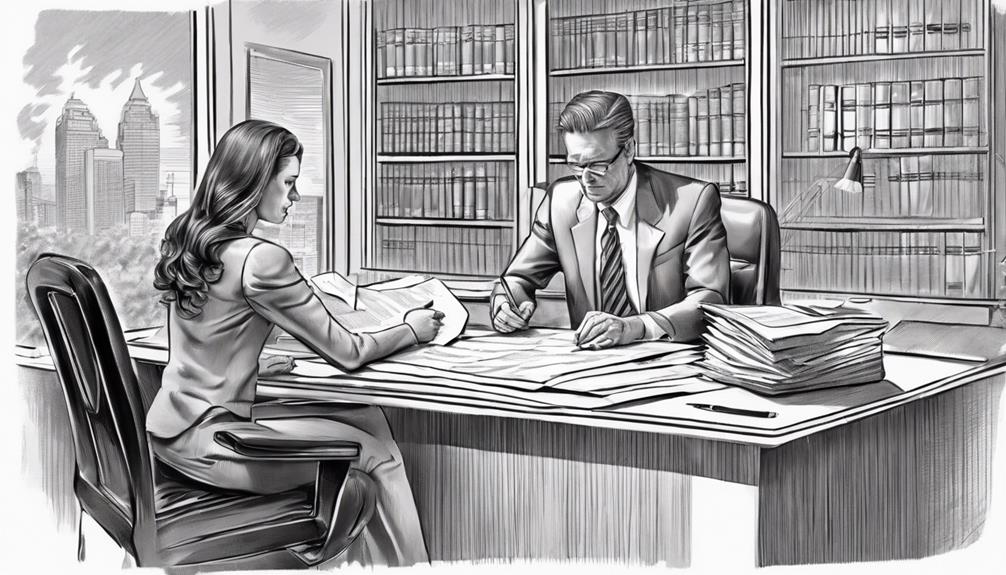As we navigate the intricate journey of life after divorce, it is akin to peeling back the layers of an onion, revealing both our vulnerabilities and strengths simultaneously.
The journey of the unfaithful towards redemption is a complex one, filled with introspection, challenges, and opportunities for growth.
But what does this path entail for those who have strayed and seek to find their way back to wholeness?
Let's explore the intricacies of this transformative process and uncover the profound insights that can emerge from the ashes of a shattered relationship.
Key Takeaways
- Acknowledge the pain caused and seek forgiveness.
- Commit to self-improvement and rebuilding trust.
- Embrace self-forgiveness for inner peace.
- Engage in therapy for personal growth post-divorce.
The Unfaithful Partner's Journey
Embarking on the journey post-divorce as the unfaithful partner can be a tumultuous yet transformative experience. The weight of guilt and shame from engaging in an emotional affair can feel overwhelming, leading to a profound sense of loss and a shattered trust both within oneself and with others. Surviving infidelity requires facing these emotions head-on, delving into the reasons behind the betrayal, and seeking a path towards healing and redemption.
Recovery from an affair demands deep self-reflection and a willingness to understand the impact of one's actions. It involves acknowledging the pain caused to a partner and loved ones, while also grappling with one's own vulnerabilities and shortcomings. Rebuilding self-esteem after the dissolution of a marriage tainted by infidelity is a daunting task, but it's a necessary step towards a healthier future. Seeking therapy or counseling to address underlying issues and commit to personal growth is crucial on this journey.
Embracing self-discovery and making positive changes are essential components of the unfaithful partner's road to redemption. It involves a commitment to understanding oneself, learning from mistakes, and striving to become a better, more authentic individual.
Seeking Forgiveness and Redemption

Navigating the aftermath of infidelity, the unfaithful partner faces the challenging yet crucial task of seeking forgiveness and redemption. It's a journey that requires sincere introspection and a willingness to confront the pain caused by one's actions.
To aid in this process, we must:
- Acknowledge the hurt and suffering inflicted upon our betrayed partner.
- Demonstrate genuine remorse and empathy towards those we've wronged.
- Commit to tangible actions and behavioral changes that show a true desire to make amends.
Seeking forgiveness and redemption after infidelity isn't a simple task; it demands humility, patience, and a genuine commitment to self-improvement. By actively engaging in this process, we can begin to rebuild trust, repair relationships, and ultimately find a path towards healing for both ourselves and those we've hurt.
Overcoming Guilt and Regret
Struggling with the weight of guilt and regret post-divorce is a common experience for those who've been unfaithful in a relationship. The aftermath of an affair can be overwhelming, with feelings of shame and remorse clouding our thoughts. As unfaithful spouses, it's essential to confront these emotions head-on. Acknowledging the pain and betrayal we caused our ex-partner and family is the first step towards healing.
Moving forward requires us to seek forgiveness – not just from others but also from ourselves. It's crucial to understand the impact of our actions and take responsibility for the hurt we've caused. By embracing this process of self-forgiveness, we can gradually release the grip of guilt and regret that weighs us down.
Personal Growth After Divorce

Experiencing personal growth after divorce entails engaging in introspection and reflecting on past behaviors to foster self-improvement and address underlying issues that contributed to infidelity. It's a journey of self-discovery that can lead to profound changes in mindset and behavior. Here are some key aspects to consider:
- Therapy and Counseling: Seeking professional help can provide valuable insights, promote self-awareness, and aid in emotional healing.
- Setting New Goals: Establishing fresh aspirations post-divorce allows for the redefinition of one's identity and purpose, paving the way for personal growth.
- Learning from Mistakes: Embracing the opportunity to learn from past errors enables the unfaithful individual to move forward with a renewed perspective and a commitment to a more fulfilling future.
Finding Peace and Moving Forward
After reflecting on personal growth following divorce, finding peace and moving forward as the unfaithful individual requires a deep acknowledgment of past mistakes and a commitment to self-forgiveness and growth.
It's essential to engage in self-reflection, allowing oneself to understand the impact of infidelity on the relationship and taking responsibility for those actions.
Moving forward post-divorce is a challenging journey that necessitates seeking personal growth and healing. Embracing redemption involves shedding guilt and shame, embracing positive changes, and rebuilding a sense of self-worth and integrity.
To find inner peace, engaging in therapy, practicing self-care, and participating in activities that promote emotional healing are crucial steps.
The path to redemption post-divorce involves embracing fresh beginnings, establishing boundaries, and creating a life that aligns with one's values and integrity.
Frequently Asked Questions
How Does the Betrayer Feel After Infidelity?
After infidelity, we feel a mix of emotions – guilt, regret, and a blow to our self-esteem. Rebuilding trust requires transparency and hard conversations. It's a journey of reflection, growth, and seeking redemption.
How Does the Cheating Husband Feel After Divorce?
After divorce, we may feel overwhelmed by guilt, regret, and loneliness. The loss of trust and credibility can be hard to bear. Financial burdens and co-parenting challenges add to the emotional weight. Seeking therapy and taking responsibility are crucial for redemption.
How Does Infidelity Affect Divorce Settlement?
Infidelity can impact divorce settlements by influencing asset division, alimony, and child custody. Courts may consider fault when determining marital asset distribution. Cheating spouses might receive less or pay more post-divorce.
Can Cheaters Ever Be Redeemed?
We believe cheaters can find redemption through genuine remorse, self-reflection, and positive changes. Acknowledging hurt, seeking forgiveness, and consistent efforts to rebuild trust are crucial. Therapy and personal growth play vital roles in this journey.
Can Inspirational Quotes Help the Unfaithful Find Redemption After Divorce?
After a divorce, the unfaithful often struggle with guilt and shame. Inspirational quotes life after divorce can provide hope and guidance for those seeking redemption. Encouraging words can serve as a reminder that it’s never too late to make amends and rebuild a meaningful life, despite past mistakes.
Conclusion
As we navigate life after divorce, it's important to remember that redemption is possible.
One statistic that may surprise you is that 67% of individuals who've been unfaithful in a relationship express feelings of remorse and a desire to make amends.
By seeking forgiveness, overcoming guilt, and focusing on personal growth, we can find peace and move forward towards a brighter future.
Remember, we aren't defined by our mistakes but by how we choose to learn and grow from them.











